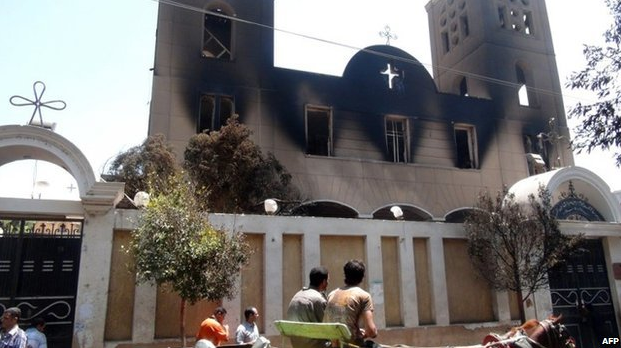The media publish regular information on arsons attacks on churches in Egypt since the mass protests following Muhammad Morsi demotion started. It’s about the attacks on the Coptic Churches all over Egypt. However, the media reported multiple attacks on churches of different Christian confessions after the security forces raided the protesters.
Headlines are typical: “The Supporters Of The Former President Committed Arson Attacks On Two Churches In Egypt”, “Islamists Commit Arson Attacks On Christian Churches All Over Egypt” and “Burning Churches: A Warning Signal For Egypt”.
No doubt there were attacks at churches along with arsons or attempts of arsons as we have numerous evidence to that from a variety of sources. But the question remains - what concrete people or organisations are behind this?
One can see two definitions of whom to blame when reading the media reports : so-called “islamists” and “the brotherhood” (aka “supporters of the former President”).
As for using the term “islamists” — let’s be honest, it’s misused even in the Muslim Media with an indistinct meaning, same as “the Egypt liberals”. One gets the impression that there is some kind of a solid islamist camp and its counter alliance (also solid) liberal camp with “the military” as a third party.
At the same time the fact that both parties aren’t solid at all. During the Parliamentary election after Hosni Mubarak was overthrown, the salafi party “Noor” won the second place with a range of differences between their programme and the one of the Muslim Brotherhood. The representatives of “Noor” repeatedly criticized President Morsi and his government for a ”little evidence of islamic activities in their everyday work”.
The only reason why the supporters of “Noor” voted for Morsi during the Presidential election was that they saw no other choice. Besides the Salafis, there are smaller and less powerful, though more radical parties among the Egypt islamists, “Taqfir-wa-l-Hijjra”, for instance. Some analysts think they can move from malicious propaganda to action, including provocations.
At the same time you can’t think of liberals as something solid, too. There are even more groups among them — marxist, leftists, nationalists, liberal democrats, authoritarians and other. As such, the attitude to military coup, repressions and the country’s prospects varies among those groups. Liberal Al-Baradei resigned and impugned credibility of the coup and their military action (after which they laid a criminal investigation against him), but the liberal Al-Beblawee shows no visible discomfort in continuing performing his Prime-Minister duties.
As for the Muslim Brotherhood official position on burning and attacking churches in Egypt, they made numerous statements on that issue. The Brotherhood condemned those barbarous attacks directly.
Some media say that some members of the Muslim Brotherhood publish materials promoting rousing hatred against Christians on their social network pages. But you can’t draw the events out of context. Egypt is being through very hard times nowadays and there are a lot of Muslim Brotherhood members and supporters around the country. Even if some of them — theoretically — could give way to their emotions and take part in those attacks, this doesn’t conform with the Brotherhood accepted view and this organisation can’t be charged responsible for the attacks.
And then again, you can’t discard possible fakes and provocations. As for the social networks, the Security Service of Egypt is capable to hack any profile (with its owner in detention or gone missing during the coup) and write whatever they want on behalf of that person. The military regime puts a lot of efforts in representing the Muslim Brotherhood and their supporters as terrorists and misanthropists. For that reason, you can’t discard provocations aiming to rise a widespread discontent and put themselves right in the West appealing to “protecting the Copts and other minorities from malicious islamist fanatics.”
The readers can vary in their valuations of the Muslim Brotherhood and criticize some or other parts of their programme and actions. But for the sake of justice one needs to acknowledge that this organisation never called to attack Christians, though it exists for a very long period, and there’s no reason for holding them responsible for burning and attacking churches.
Source: ArabPress



